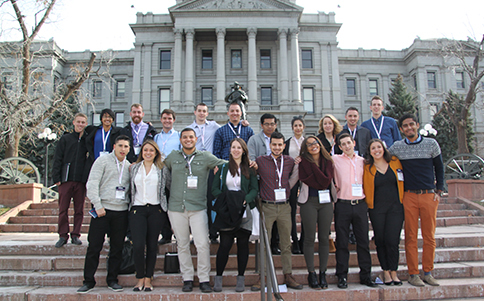
Rutgers ASLA Student Chapter members on the steps of the State Capitol in Denver, CO.
Front Row, L-R: Shaun Thomson, Alyssa Vianni, Josh Rodriguez, Theresa Hyslop, Teddy Aretakis, Amber Betances, Danny Rodriguez, Sandra Grosso and Arturo Hernandez.
Back Row, L-R: John Jacobs, Sarah Korapati, Austin Scott, Mark Lacey, Scott Miller, James Cocorles, Eugene Fernandez, Christie Saliba, Grace Kinney, Brian Maher and Jacob DeBoer. Photo: Ellen Gallagher.
Submitted by Ellen Gallagher, president of the Rutgers Student Chapter of the American Society of Landscape Architecture, who also attended the national ASLA conference.
Members of the Rutgers Student Chapter of the American Society of Landscape Architecture (ASLA) went to the National ASLA convention in Denver, Colorado, late last year and for many of us, it was our first time going out West. As students of landscape architecture, we learn about places and space but there is really no comparison to experiencing space. Flying in from New Jersey, the landscape changed drastically. The earth seemed as if it was endless, interrupted only by the eruption of the Rocky Mountains out of the flat land. We were enthralled.
Maybe it was the altitude, or maybe it was the excitement buzzing around us at the idea of being among some of the top landscape architects in the country, but all twenty of us could not wait to arrive at the convention center. While each of us took away different tokens of memory, one lecture resounded in all of our minds. The keynote speech by Dr. Robert Bullard about Environmental Justice related to all of us and left us talking about it afterwards.
Grace Kinney, a graduating senior, writes “Bullard provided maps with various kinds of analysis supporting how health, education, and transportation are lacking in southern cities, and his research shows that environmental injustice affects the African American race indisputably. He advocated that sustainability must address and integrate equity, social inequality, and community resilience, and that these three things must not be an afterthought in design. He claimed that addressing these equity issues is a prerequisite to achieving sustainable and livable communities.”
Bullard’s work gives us reason for why we become landscape architects, so that all people can have access to green open space and cities are spaces where people can be prosperous in their social, physical, and mental aspects of their life.
Junior Amber Betances speaks about how the lecture ignited an interest in her for studying environmental justice issues. “Robert Bullard’s lecture helped me determine that I want to be someone to help solve these issues. To help the people who have no voice, to help them move forward to over come these injustices. I want to work on promoting environmental justice and sustainability. I haven’t figured out how I will make a difference in these communities, but through educating myself, and others, I feel I am capable of making a difference. Robert Bullard’s lecture opened my eyes to things I never knew and helped begin to form the path that I want to pursue.”

Rutgers ASLA Student Chapter members pause for a picture in the Red Rocks Park, a mountain park owned and maintained by the city of Denver.
Senior Mark Lacey also observed, “Dr. Bullard was an amazing speaker who talked about his work researching decades of environmental injustice that occurred throughout the United States. According to his findings, the placement of landfills and waste facilities in many southern states has been pushed towards mostly black, poorer communities, leading towards many health issues with people living there. This session definitely helped motivate me for the future, and helped me realize that the profession of landscape architecture can have so much more power than just designing.”
Overall, the keynote changed our minds about what it means to be a landscape architect. As senior Teddy Aretakis observed in a lecture he attended, “We’re not experts at anything, but we’re really good at a lot of things.”
But even more than that, we can work with a lot of people who are experts and who are excellent at a lot of other things. The possibilities for cross collaboration between fields could be where our future is headed, and how interesting this is for us students, who are emerging into the professional world.
ASLA in Denver was the largest gathering of landscape architects I have ever seen, but at this keynote we all were at the edge of our seats listening to a sociologist. There is a perception that once we leave school, we will have to know everything, but the truth is, we can never stop learning. The sharing of ideas across fields can lead to new perspectives and open doors to possibilities we never imagined!
All of us arrived back in New Jersey inspired to take on the semester ahead, believing that we could make a difference.

